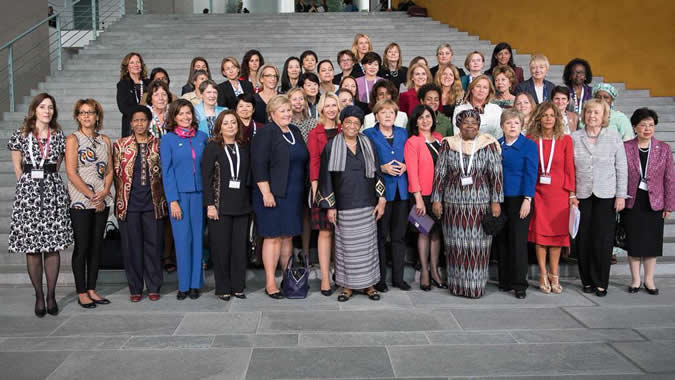Alicia Bárcena Participated in a Dialogue with Women Leaders in Berlin
Work area(s)
ECLAC’s Executive Secretary analyzed international cooperation in the framework of the G7 during a forum convoked by German Chancellor Angela Merkel.

During a forum of women leaders convened by German Chancellor Angela Merkel, the Executive Secretary of the Economic Commission for Latin America and the Caribbean (ECLAC), Alicia Bárcena, called on the Group of Seven (G7) to use a collective approach to address the matter of international cooperation in order to resolve global problems, including the migratory crisis.
Bárcena spoke in the name of a region that is considered to be middle income and no longer qualifies to receive Official Development Assistance (ODA). “We have to think about what kind of cooperation we want to establish,” the international official said during the Forum for Dialogue with Women, inaugurated this Wednesday, September 16, in Berlin, Germany.
The event—which will conclude on Thursday, September 17—was convoked by Chancellor Merkel in the framework of the G7 presidency, which is currently being held by Germany. Female leaders from the G7 countries (Canada, France, Germany, Italy, Japan, the United Kingdom and the United States) and from other regions gathered to discuss the empowerment of women and girls throughout the world.
Participants included Liberian President Ellen Johnson-Sirleaf; the Administrator of the United Nations Development Program (UNDP), Helen Clark; the Director-General of the World Health Organization, Margaret Chang; the Executive Director of the United Nations Entity for Gender Equality and the Empowerment of Women (UN Women), Phumzile Mlambo-Ngcuka; and businesswoman and philanthropist Melinda Gates, among other prominent international figures from diverse fields.
During the gathering, participants highlighted the importance of the 2030 Agenda for Sustainable Development, which will be adopted officially on September 25 during a summit in New York; they placed special emphasis on Sustainable Development Goal (SDG) number 5, which promotes gender equality and the empowerment of women and girls.
In this regard, ECLAC has insisted on the need to make progress on the three types of women’s autonomy: economic, physical and in decision-making.
With respect to the first type, Latin American countries have increased the proportion of women in the labor market; however, in the last 10 years the rate of female activity has remained stagnant at around 53%, which reflects a ceiling on the incorporation of women into the remunerated workforce.
In addition, 79% of these women are employed in sectors that ECLAC defines as being of low productivity, which implies lower pay and less contact with technology and innovation.
According to figures from ECLAC’s Gender Equality Observatory (GEO), one in every three women in Latin America and the Caribbean still does not have her own source of income. This means that these women depend on other members of the household for any purchasing movement in the market. Meanwhile, it has been demonstrated that in all of the region’s countries the total workload for women is systematically heavier than that of men.
To implement better public policies oriented towards women’s autonomy, ECLAC contends that robust, reliable and systematic information is needed that reveals the situation of men and women in the economy and in society as a whole.
Country(ies)
- Latin America and the Caribbean
